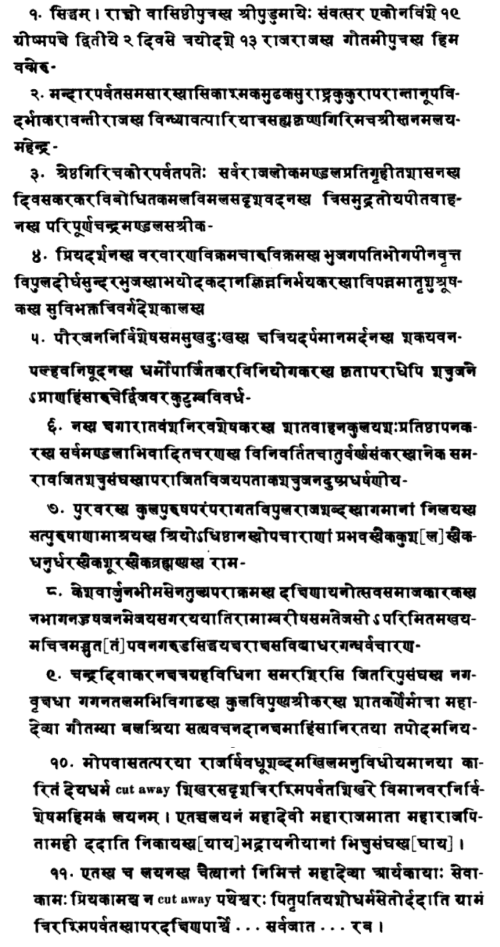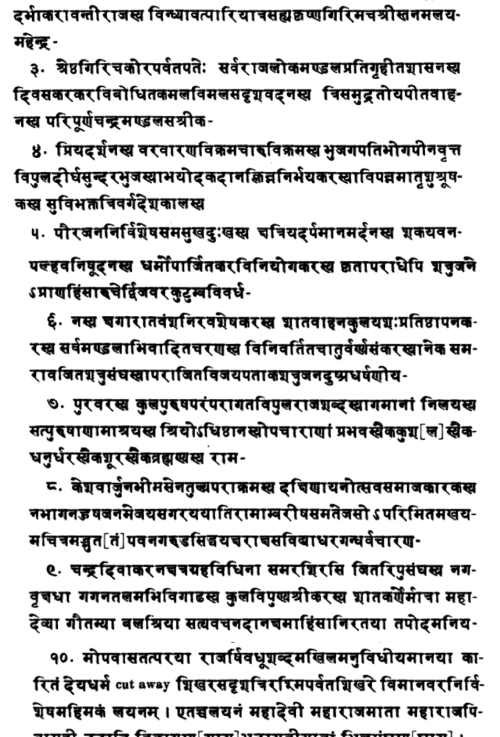Nasik Inscription of Gautami Balasri, the mother of Gautamiputra(obvious, right?) Satakarni) is such a famous inscription, known by it’s famous name Nasik Prasasti is one of the most important ones over Satavahana history. Well, everyone knows the name and none knows what it contains, especially in these days of euphoria of the Telugu movie over the Emperor. Ironically, it’s not even available that easily. The inscription is located in Cave 3 of Pandulena Cave Complex commissioned by Gautami Balasri. This is an inscription of propaganda with some serious information over the empire – the extent of his empire, his religion being Hindu and the most important, exterminator of the race of Khagarata, assumed to be Kshaharata(Western Khsatraps). Well, the other line, the Kardamakas took their place almost immediately making his conquests not so permanent. People won’t be happy at this negative note, but, well, the inscription below. The inscription is by comparing wikipedia with an entry in a historic book and let’s hope it’s the correct one.

This cave temple, a benefaction, the greatness of which is not excelled by the best of Vimanas, is caused to be constructed on the summit of Trirasmi, which is like the summit of (??) on the 13th thirteenth day, in the 2nd second fortnight of Grishma, in the year 19 nineteen of the King Sri Pudumayi, the son of Vasishthi, by the Great Queen Gautami, the presiding genius of power, taking delight in veracity, charity, forbearance, and abstinence from killing, devoted to religious austerities, self-restraint, vows and fasts, and acting in every way as befits the title of daughter of royal sages and the mother of Satakarni Gautamiputra, the King of Kings, whose might is equal to that of the mountains Himalaya, Meru and Mandara; who is King of Asika, Asmaka, Mudhaka, Surashtra, Kukura, Aparanta, Anupa, Vidarbha, Akara, and Avanti, and lord of the mountains Vindhyavat, Pariyatra, Sahya, Krishnagiri, Malaya, Mahendra, Sreshthagiri and Chakora; whose orders are obeyed by the circle of all kings, whose pure face resembles the lotus blown open by the rays of the sun, whose beasts of burden have drunk the waters of the three seas, whose look is as graceful and lovely as the full disk of the moon, whose gait is as pleasing as that of an excellent elephant, whose arm is as stout, rounded, massive, long and beautiful as the body of the lord of serpents, whose fearless hand is wetted by the water poured in granting asylums, who serves his living mother, who has well arranged the times and places proper for the triad, whose happiness and misery are the same as, and not different from those of his citizens, who has quelled the boast and pride of Kshatriyas, who is the destroyer of the Sakas, Yavanas and Palhavas, who spends the revenue got from taxes levied only according to the law, who does not like to destroy life even in the case of enemies who have given offence, who has increased the families of the best of Brahmans, who exterminated the race of Khagarata, who has established the glory of the family of Satavahana, whose feet are adored by the whole circle of kings, who has stemmed the confusion of the four castes, who has conquered the host of his enemies in innumerable battles, whose great capital is unapproachable to his enemies and has its victorious flag unconquered, to whom the great title of king has descended from a series of ancestors, who is the abode of learning, the support of good men, the home of glory, the source of good manners, the only skilful person, the only archer, the only brave man, the only supporter of Brahmans, whose exploits rival those of Rama, Kesava, Arjuna and Bhimasena; who holds festive meetings on the occasion of the summer solstice, whose prowess is equal to that of Nabhaga, Nahusha, Janamejaya, Sagara, Tayati, Rama and Ambarisha; who conquered the host of his enemies in the brunt of battle in a curious and wonderful manner in virtue of his innumerable worships and observances, and by means of rites concerning the wind, Garuda, Siddhas, Yakshas, Rakshasas, Vidyadharas, ghosts, Gandharvas, Charanas, the moon, the sun, the constellations and planets; who erects his neck high in the sky like mountains and trees and who has brought prosperity to his race. The great Queen, the mother of the Great King and the grandmother of the Great King, gives this cave to the congregation, the host of mendicants of the Bhadrayaniya school. The Lord of (??)patha, desirous to please and to serve the venerable lady, the great Queen, grants a village on the south-western side of the Trirasmi mount for the sake of the Chaityas in the cave temple, in order thus to prepare a bridge for the fame and religious desert of her father and husband
